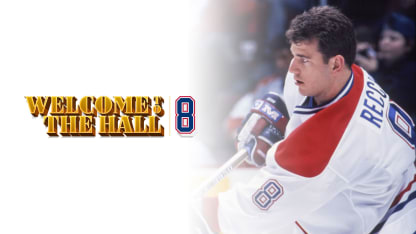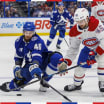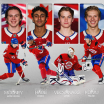By Hugo Fontaine
Mark Recchi has been keeping himself busy in his post-playing days. After taking a break to enjoy life when he retired as a player in 2011, he has made his way back to the NHL in recent years, notably by winning the Stanley Cup in the last two seasons as player development coach with the Pittsburgh Penguins.
Prior to his recent back-to-back conquests, the last memory the hockey world had of him on the ice is of Recchi him lifting the Cup high above his head in a Boston Bruins uniform. That moment was a tough pill to swallow for some Canadiens fans, who might have found it hard to watch one of their former stars lifting hockey's holy grail while wearing the colors of one of their biggest rivals.
Recchi had already raised the ire of Habs fans with some comments he made in the aftermath of the Zdeno Chara / Max Pacioretty incident - when the Bruins captain injured the Canadiens sharpshooter with a check into the Bell Centre stanchions in March 2011. Suddenly, the two Molson Cups he won as the Montreal's player of the year seemed like they had happened eons ago.
"Sure it was [difficult to hear the criticism]. But you know what? That's the competitive spirit of the fans in Montreal. They're competitive people and they love their team," explained Recchi, who had suggested at the time that the Chara hit hadn't injured Pacioretty as badly as it had seemed. "I understand completely. It's not a big deal to me. It's one of the top rivalries in the sport - in any sport.
"People never came up to me and said, 'What's up, Dr. Recchi?' to my face, but they did it on social media," he added with a laugh. "I respected everybody in Montreal, especially the fans. I came to play for them every night and loved every minute of it. I understand that they're passionate about the game and that's outstanding."
The Kamloops, BC native is sincere when he says he adored his four years with the Canadiens. When he arrived in Montreal in February 1995, he was greeted with plenty of pressure, joining a team going through some ups and downs following their Stanley Cup win two years prior. Aware of how much he'd be counted on once he arrived, Recchi responded to the challenge. He quickly understood what kind of environment he was walking into.
"I remember coming in the first day and I saw all the media and TV cameras. There was a blizzard out when I flew in. But still, there were a lot of trucks with people waiting for me. Stepping into the Montreal Forum and walking in that locker room... I had been in it once for the All-Star Game in 1993, but walking in as a member of the Canadiens and knowing that it was going to be my home dressing room was pretty incredible," remembered Recchi, who split his first seven years in the League between Pittsburgh and Philadelphia before landing in Montreal. "It was exciting. Knowing the history of the game and the tradition of the Montreal Canadiens, I was excited about it.
"I adjusted pretty easily and that's the great thing about hockey in general. Once you're on a new team, you're welcomed with open arms. It's one big family and you look after each other. I felt great right away and I was included and part of it from Day 1. That was huge."
He credits many of those new teammates with helping him get settled, but none more than his then-captain, Kirk Muller.
The two players knew each other well from their days battling it out on opposing sides of the Penguins-Devils rivalry, and "Captain Kirk" respected Recchi immensely for what he had accomplished by then. The fact that they would now be skating on the same side allowed the veteran leader to uncover another side of the man who was once his bitter enemy on the ice.
"I had heard lots of good things. We actually roomed together [on the road] at the time. He was a great roommate. We spent some time away from the rink as well. He loves his red wine, that's one of his hobbies," recalled Muller with a chuckle, having spent just a few months bunking with Recchi before being traded to the Islanders in April of that year. "It was fun rooming with him."
Jean-Jacques Daigneault was Recchi's opponent in the NHL for many years, but was spared from having to face the gritty forward for almost two seasons in Montreal. As teammates, he only had to worry about containing him during practice. The Habs' current assistant coach has only the best memories of the man who finished Top-3 in team scoring in each of his seasons in La Belle Province.
Despite Recchi's nose for the net, it wasn't his former teammate's offensive prowess that stuck with Daigneault. He insists that Recchi's impact went much further than his knack for putting up points, referencing the work ethic and effort that went into getting such stellar results for so many years.
"He had a lot of leadership skills and he projected them well. He worked very, very hard. When you play with a guy like him, you see the time he put into his on-ice and off-ice training and you see how disciplined he was," outlined Daigneault, who played with Recchi in Montreal in 1994-95 and 1995-96. "That makes you realize how he was able to get the results he did.
"He was the type of player you could easily forget about on the ice," he added. "A bit like Mike Bossy, if you lost sight of him for a couple of seconds, he would put it in the net. He was always in the right place to generate shots."
In addition to currently occupying 12th spot on the League's all-time scoring leaderboard with a career tally of 577 goals and 956 assists for 1,533 regular-season points, Recchi was also known as one of the most durable players in NHL history. In a sport as physically demanding as hockey, to not miss a single game in almost eight years is quite the feat.
Despite the pitfalls and risks that come with the job, Recchi always gave his all for Canadiens fans and he came to play every night. The only time he wasn't able to was when pneumonia kept him out of the lineup on December 12, 1998, ending his streak at 570-consecutive games played.
"I lost 20 pounds and I tried playing through it, but I wasn't very effective. I just couldn't do it," outlined Recchi, who, before missing that game, had not sat out a contest since March 31, 1991.
"I took huge pride in it. Being really reliable for my teammates, my coaches, my organization. I took pride in being there every night and being a player that they could count on to play hard every night. Not to just go out and play, but to play hard and play the right way.
"To go through a stretch like that was great," he continued. "Obviously I had a lot of luck, and I played through a lot of injuries, but at the same time, I wanted to be on the ice with my teammates and I wanted to help them out."
Despite sharing a dressing room for just 24 games, Muller quickly understood that Recchi's success on the ice and his ability to show up every night weren't fuelled by luck.
"A lot of it comes from his professionalism and his preparation. He trained hard and kept himself in good shape. He was durable. He wasn't tall, he was a stocky guy," described Muller, who was also Recchi's linemate during their short stint together. "When you're smart and you know how to play the game, you avoid putting yourself in tough situations sometimes. But he also wasn't afraid to go in the dirty areas. That's where he earned a lot of his points."
He may well have enjoyed his best seasons with other teams, winning the Cup three times in other uniforms - with the Penguins, Hurricanes and Bruins - but on March 11, 1996, in Montreal, the now-49-year-old got to experience something he considers himself incredibly privileged to have been a part of.
With a bevy of former Habs legends in the building, Recchi took part in the final game at the iconic Montreal Forum. The emotions he felt that night and the memories of the ceremony that took place after the final win will be etched in his mind forever.
"The closing of the Forum was one I'll never forget, playing that last game there," admitted Recchi, who collected two points in the Habs' 4-1 win over the Stars on that historic evening. "Opening up the Molson Centre... those are things you just never forget. Those were special times."
The moment he'll be experiencing on Monday night, when he will be officially inducted into the Hockey Hall of Fame in Toronto, will surely become the highlight of his brilliant 22-season career in the NHL. But of his own admission, the 346 games he played in bleu-blanc-rouge aren't far behind.
"I'll never forget the rich history of the Montreal Canadiens and to be part of it was incredible," he concluded. "It was an incredible honor to play for the Canadiens."



















